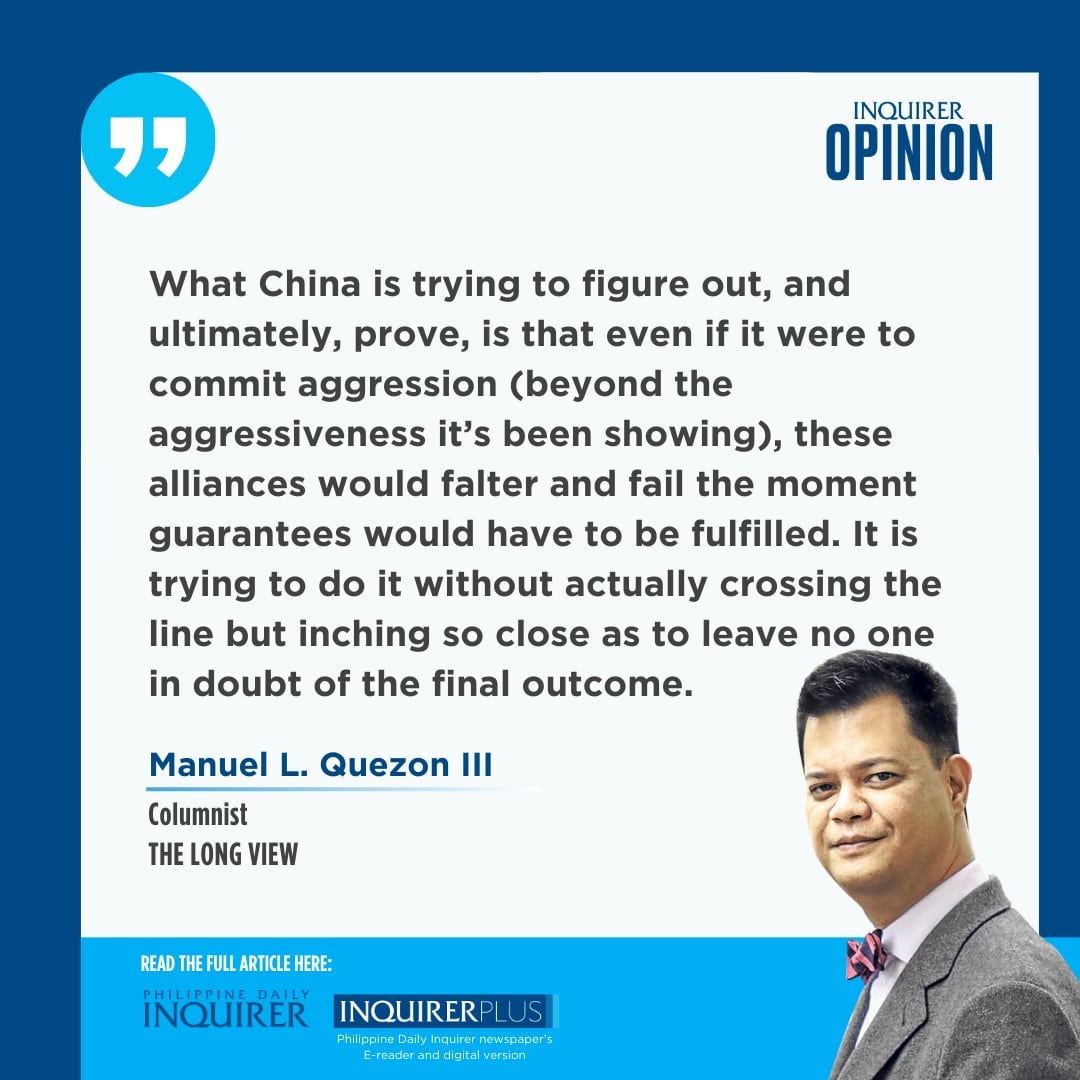The limits of deterrence
A Filipino-American archaeologist some years back shared a theory he was developing, which argued that our ancient ancestors made no distinctions between land and sea as far as territory was concerned. This is in contrast to us, where we view the land as ending at the sea, with the sea as a kind of intervening expanse between islands. I’ve often wondered if there isn’t a kind of residual, ancestral memory of this in the way we approach issues such as the West Philippine Sea which have resulted in our being at loggerheads with China. The latest example of this is the Escoda Shoal, where, after five literally bruising months, our coast guard has withdrawn BRP Teresa Magbanua, with a replacement due at some unspecified date.
At first blush, who stays anchored in a spot of ocean seems a rather strange way to dispute a territory. We forget that for China, anchoring is only the first step: after anchoring a flotilla in a disputed place, other vessels can follow with the ultimate aim of creating an artificial island where there was none before. This then allows China to plant a flag on an island of its own making, and by so doing, expand the associated areas of the seas that can be claimed by China according to international law: moving the goal posts, to speak, each time.
Article continues after this advertisementHaving no such capabilities, all we can do is assert our exclusive economic zone (EEZ), as measured from our existing islands while invoking the right to assert it should be measured from our continental shelf; in either case, our claims and the basis for it in law stems from places that have existed as part of our territory as long as international law has existed. China, on the other hand, is constantly redefining its definition of its territory. All to further turn into a fait accompli, claims it had made during the time of Chiang Kai Shek (the nine-dash line). The bedrock principle is an ancient one: Possession is nine-tenths of the law.
But modern international law is precisely meant to set aside ancient principles that, like the one on occupation, are themselves subsets of the most ancient principle of all, might makes right. Instead more modern, objective principles are supposed to replace old practices and even conventions: for example, the very idea of an EEZ, or that of freedom of navigation, or measuring zones from the continental shelf.
These are still principles many Filipino lawyers find difficult to fully digest, much less accept: hence the pointless obsessing with antique maps and other artifacts of a more imprecise age, not to mention asserting historical claims that are beyond resolution (we could, once we get powerful enough, attempt to claim Palau, which had an appointed delegate to the Malolos Congress, or Guam, territorially once part of the Archdiocese of Cebu, or, indeed, that big swathe of the Pacific including our present-day territory but also that Micronesia and the Northern Marianas and everything formerly called the Spanish East Indies).
Article continues after this advertisementSome of the claims that have been made, as I’ve pointed out before, clash with what we are trying to defend, and the instruments we have invoked for their defense, such as the Arbitral Award: Sabah and the Kalayaan Islands, the former invoking the obsolete notion of historical title, and the latter, a unilateral act made outside the mechanisms established to resolve competing claims. Both date to the first Marcos administration and are an outlier from what came before, and after, and which has been enshrined in every one of our Constitutions since 1935: invoking and adhering to international law. One precept of the modern age is that the nation that engages in aggression is a nation in the wrong.
This is why our alliances exist, by the way: They are meant to deter aggression, and can only be invoked when the parties concerned are themselves the victim of aggression. Because every nation has the right to self-defense. This is why these defense treaties conform to that other bedrock constitution principle, that we renounce war as an instrument of national policy.
What China is trying to figure out, and ultimately, prove, is that even if it were to commit aggression (beyond the aggressiveness it’s been showing), these alliances would falter and fail the moment guarantees would have to be fulfilled. It is trying to do it without actually crossing the line but inching so close as to leave no one in doubt of the final outcome.
—————-
Email: mlquezon3@gmail.com; Twitter: @mlq3

















